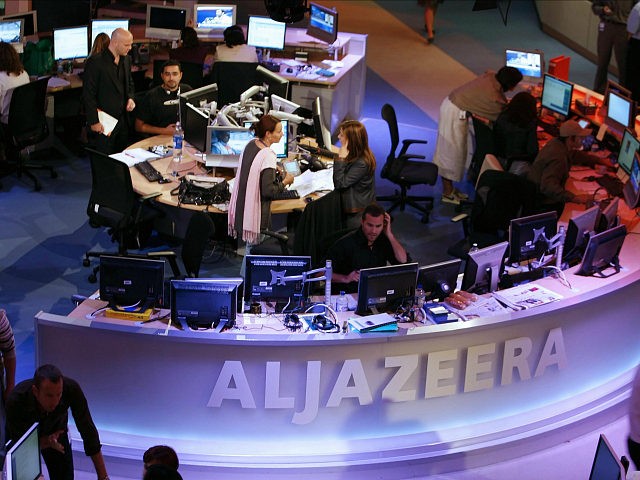On Thursday night, the Associated Press reported that Kuwait, acting as an emissary for the other nations blockading Qatar, presented the Qatari government with a list of thirteen specific demands, with just 10 days to comply.
The list is presented as the best deal Qatar will get, and it comes off the table 10 days from now. The Associated Press notes that other possible consequences of failing to meet the demands are not specified.
Some of these demands are quite extensive, so Qatar has a lot more than thirteen tasks to complete before it can regain the good graces of its Gulf Cooperation Council allies. For example, one of the requirements is to sever all ties to terrorist organizations, including the Muslim Brotherhood, al-Qaeda, and Hezbollah. Qatar must also formally declare all of those entities terrorist groups, a measure more stringent than even the current U.S. policy approach to the Muslim Brotherhood.
Qatar must furthermore surrender individuals wanted on terrorism charges it has been sheltering, freeze their assets, and refrain from giving citizenship to wanted nationals from the other Arab states. Qatar is also commanded to pay reparations for damage and loss of life resulting from its support for terrorism and insurgency, with a precise amount to be determined later.
Qatar is also instructed to shut down Al-Jazeera and all other news outlets it funds, a list even longer than the list of terrorist organizations Qatar has been accused of supporting.
The other Arab states demand that Qatar cease interfering in their internal politics, break all ties with opposition groups, and produce files documenting all of the support they have previously given to the political opposition in nations like Saudi Arabia, Egypt, and the United Arab Emirates.
The other Arab states have no intention of taking Qatar on faith that it has complied with these instructions because one of the thirteen demands includes monthly audits of oil-rich Qatar’s finances for a year, quarterly during the second year, and then annually for eight more years after that.
The most politically explosive demands on the list – assuming Qatar does not explode over being treated like a criminal on probation for supporting terrorism – concern Iran and Turkey.
It is not surprising that Qatar would be told to sever all ties with Iran, suspend military cooperation, and expel any members of the Iranian Revolutionary Guard Corps currently in Qatar because the emirate’s relationship with Iran has long been a sore point with the Saudi-led alliance of Sunni Muslim nations.
However, the list of demands also includes ending Turkey’s military presence in Qatar and terminating joint military projects with the Turkish government. Turkey immediately rejected this demand, and instead suggested it might increase its presence in Qatar.
“The strengthening of the Turkish base would be a positive step in terms of the Gulf’s security. Re-evaluating the base agreement with Qatar is not on our agenda,” said Turkish Defense Minister Fikri Isik. “The base in Qatar is both a Turkish base and one that will preserve the security of Qatar and the region.”
The UK Guardian quotes British Foreign Secretary Boris Johnson swiftly dismissing the entire list of demands as unreasonable.
“Gulf unity can only be restored when all countries involved are willing to discuss terms that are measured and realistic. The UK calls upon the Gulf states to find a way of deescalating the situation and lifting the current embargo and restrictions which are having an impact on the everyday lives of people in the region,” said Johnson.
The Guardian also quotes the English-language managing director of Al-Jazeera, which is the most-watched network in the Arab world, insisting that efforts to shut down the operation were “nothing but an attempt to muzzle a voice of democracy in the region and suppress freedom of expression.”
The states aligned against Qatar, on the other hand, maintain Al-Jazeera is a Qatari-funded propaganda organ for extremists and has been used as a tool for destabilizing Qatar’s neighbors.
Reuters describes the list of demands as an “ultimatum” to Qatar and notes the Qatari government did not immediately comment on it, although it has previously stated it will not enter negotiations until the virtual blockade against it has been lifted. Qatar’s adversaries, particularly the United Arab Emirates, have expressed a willingness to maintain sanctions for years if Qatar does not comply with the demands made of it.
The UAE, incidentally, is angry at Qatar for allegedly leaking the list of demands to global media, although Reuters says it obtained its copy from “an official from one of the sanctioning countries.”
Reuters did manage to obtain some man-on-the-street feedback from Qataris, who seem to universally regard the list of demands as unreasonable. One of them compared shuttering Al-Jazeera to another country telling the United States to close down CNN.
Speaking of CNN, it reports that sources within the Qatar government said a formal response to the list of demands would be issued sometime on Friday.
Washington’s response will also be interesting since different elements of the Trump administration have expressed varying levels of support and criticism for Qatar. CBS News postulates that the administration has grown “increasingly frustrated by the Saudi-led embargo on the tiny Gulf state, and the inability of the neighboring nations to ease the tension.”
Both within and outside the administration, even critics of Qatar are divided over the diplomatic crisis and the prospects for resolution. CBS points out that some of the states aligned against Qatar are themselves guilty of supporting extremist groups, so there could be a degree of projection or distraction involved in making Qatar suffer for their mutual sins.
An optimist might hope the other Sunni states have seen the error of their ways and intend to clean up their acts after reaching an agreement with Qatar, but that degree of optimism is hard to come by in the Middle East.

COMMENTS
Please let us know if you're having issues with commenting.